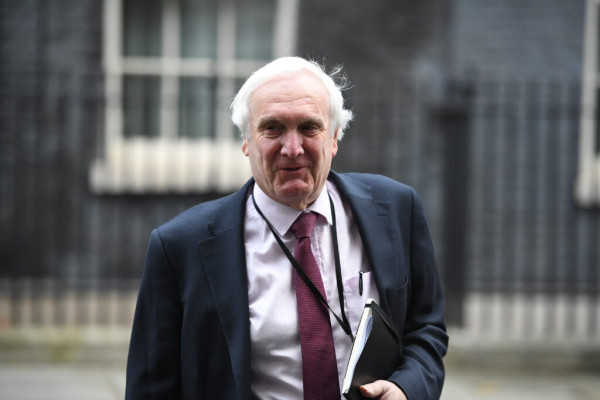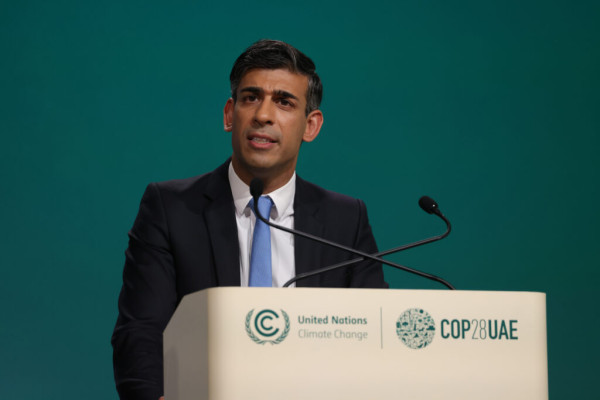Rishi Sunak’s Brexit trade agenda is faltering. Are the Gulf states his last hope?
LONDON — On the Red Sea coast at the northwest tip of Saudi Arabia, plans for an outlandish £400 billion ‘mega-city’ featuring an artificial moon and flying taxis are starting to take shape.
While far from completion, the enigmatic project — known as NEOM — has become a symbol of the vast oil-derived wealth of the country that the U.K. government hopes to tap into through a free trade agreement with Gulf states.
Bruised by a recent breakdown in talks with Canada and disheartened by sluggish progress with India, Rishi Sunak’s government is increasingly setting its sights on this gold-lined pocket of the Middle East in what looks to be his last chance for a preelection trade win.
But not everyone is thrilled at the prospect of closer economic ties with countries condemned for their human rights abuses and environmental record — not to mention the furore over the sale of the governing Conservative Party’s most beloved broadsheet to a UAE-backed fund.
Trade talks with Gulf Cooperation Council countries — which include Saudi Arabia, United Arab Emirates, Bahrain, Kuwait, Oman and Qatar — have gained momentum in recent months, with U.K. negotiators flying out to Riyadh for intersessional talks this week.
Yet any trade deal struck with the six-nation bloc in the coming months will only marginally improve Britain’s current WTO trade terms with the countries, two people briefed on the deal told POLITICO.
And when it comes to improving access for Britain’s key services sector, “I’m not hearing anything exciting at all,” said a senior representative from a major British services firm. Like others quoted in this story, they were granted anonymity to discuss ongoing negotiations.
Momentum in the talks follows a flurry of ministerial visits to the region in recent months, sparking speculation a deal is within grasp. Negotiators are up against the clock to bag it before Britain’s election expected in the autumn.
A preelection push
Edward Lister, ex-chief of staff to Boris Johnson, former special envoy to the Gulf and chair of the UAE-UK Business Council, believes the government is keen to get the deal done before the election.
“There is a big push by both the GCC … and the U.K. government to try and get this wrapped up,” he said. “They’re actually negotiating during Ramadan — which is unusual, to put it mildly, and which I think shows the seriousness of it.”
A No. 10 official insisted that Prime Minister Rishi Sunak “wouldn't sign anything off to an arbitrary timeline.”
“It’s his belief that you don’t sign off things that are the easy thing to do, just to have a moment in the sun,” they said.

But Lister said he was “picking up that they are pretty close on a lot of the individual chapters,” adding “I certainly know from talking to people that they have closed off some of the hard ones.”
A senior British business representative briefed on the deal agreed. “Strategically, I think they’d want to try and get GCC done before the U.K. election or at least get political signature done.”
“Outside of the [trans-pacific partnership deal], nothing is going to have the ability to be ratified here until the next parliament, until the next government,” they added But they pointed out that it would be “very difficult for a future government to rescind on a political signature of a previous administration.”
The business representative said negotiators had been “going around various chapters” and were making “steady progress.” But they added that most of the GCC deal would be on “enhanced World Trade Organization terms” as opposed to “anything that’s significantly ambitious.”
The deal will be “marginally WTO plus,” said a second figure from a major services firm. This means the deal will slightly push beyond existing market access and non-tariff barrier requirements under World Trade Organization rules.
Bradley Jones, executive director of the UAE-UK Business Council, suggested the deal might be seen as an easy win for the government. “My impression is that both sides are keen to get this moving and get it over the line. Given the U.K. government have had challenges in securing a deal with India, a GCC-UK FTA might be seen as low-hanging fruit that they can get over the line without too much effort.”

“For the UAE itself they want to get the GCC deal resolved because … they are more keen to start moving on a broader and more ambitious bilateral deal,” Jones added.
Neil Quilliam, associate fellow of Chatham House’s Middle East and North Africa Programme, said bilateral relations with individual GCC states were “more important than a wider GCC deal - both strategically and geopolitically.”
Nevertheless, he said, for the Conservative government, “the prospect of landing a wider GCC deal serves its domestic constituency well — at least, optically — in the post-Brexit environment.”
Lister insists a GCC deal will yield “enormous benefits” to British businesses, especially when it comes to simplification of paperwork and tariffs, and could provide an important “baseline” for talks with individual countries.
Jones agreed. “On average, tariffs on UK goods exports to the Gulf are about 5.5 percent,” he pointed out. “If you get rid of that it’s an immediate 5 percent boost.”
Sunak’s last hope
Britain is currently seeking deals with a number of nations, including Canada, India, Mexico, Switzerland, South Korea and Turkey. But its post-Brexit trade agenda has faltered in recent months.
UK NATIONAL PARLIAMENT ELECTION POLL OF POLLS
All 3 Years 2 Years 1 Year 6 MonthsSmooth KalmanFor more polling data from across Europe visit POLITICO Poll of Polls.
Canada talks broke down in January following a disagreement over Canadian hormone-treated beef access and British cheese. India talks were put on hold last week for the Indian election and talks for a foundational pact with the U.S. have been quietly shelved. Others are still in relatively early stages.
William Bain, head of trade policy at the British Chambers of Commerce said that out of all the deals under negotiation, a GCC deal “is the one that is most likely to be agreed before the election. It makes sense for them [negotiators] to focus on this given there won’t be any formal negotiations with India until after the election cycle — probably not until June.”
However, he insisted that the current government has a “different approach now than the one we had with [Boris] Johnson and [Liz] Truss, where time limits were set for negotiations.”
Since 2022, Britain’s trade chief Kemi Badenoch “has been saying it’s about getting balanced deals not setting arbitrary time limits,” Bain added.
U.K. modeling suggests that a free trade agreement with the bloc could boost U.K. GDP by around £1.6 billion to £3.1 billion in 2035 — a lift to GDP of 0.06 to 0.11 percent. Sectors which stand to benefit the most include manufacturing, agriculture, chemicals, textiles, and business services.
“We are the second largest services exporter in the world and services account for more than half of UK exports to GCC countries,” said a U.K. government spokesperson. “We predict that a trade deal with the GCC could increase UK GDP by £1.6bn and wages by £600m and we will be seeking to maximise this enormous opportunity for the UK in negotiations.”
“We are confident that any future UK-GCC deal will boost this booming trading relationship further and unlock new opportunities for our world-leading service exporters in areas such as digital, architecture and fintech,” they added.
The Telegraph conundrum
Unfortunately for negotiators, politics could get in the way. Last week, the U.K. government caved in to pressure to stop foreign governments buying U.K. media organizations — following a huge backlash over plans to sell the Telegraph newspaper to a UAE-backed fund.
The government is now planning to update the media merger regime “explicitly to rule out newspaper and periodical news magazine mergers involving ownership, influence or control by foreign states.”
Culture Secretary Lucy Frazer has told parliament she is also “minded to” refer the deal for further scrutiny by Britain’s competition regulator.
Alistair Burt, former Minister of State for the Middle East under Theresa May, said: “The U.K. must take its position in relation to the issue of how it sees the freedom of the press. But the fact that it’s the UAE which is a close partner in many ways will have been noticed. So it’s not an easy situation.”
Quilliam said it was “unlikely” that the potential blocking of the Telegraph deal would derail an agreement with the GCC, “though it may give rise to further delays and create additional hurdles that the U.K. has to clear.”
“Ultimately, the UAE is a rational actor and though it will feel slighted by the senior ranks of the Conservative party, rather than the government itself, its actions will be informed more by national and financial interests, than sentiment,” he added.
‘Diabolical’ human rights record
Concerns over human rights have also loomed over the negotiations.
TUC General Secretary Paul Nowak believes the government should not be engaged in trade talks with GCC until abuses of labor rights and human rights are addressed.
“The GCC includes states that rank among the worst in the world for abusive labor practices,” he said. “In some of these states, trade unions are banned and migrant workers are systematically abused through the kafala system.
“We also have major concerns about basic human rights being denied to women and LGBT+ people in many Gulf States.”
Nick Dearden, director of campaign group Global Justice Now, warned “enhancing investment protections with countries so heavily dependent on fossil-fuel economics further risks our own climate targets.”
Dearden described the human rights policies in Gulf states as “diabolical.” “The U.K. government seems to think that if we purchase more of each other’s goods and services, this will magically improve, but there’s no evidence to back that view up.”
Polly Trustcott, Amnesty International UK’s foreign policy adviser, said any deal should include “proper safeguards and monitoring systems” built in to address issues such as “curbs on freedom of speech, institutional discrimination against women and LGBTQ+ people, widespread labor exploitation and bans on trade unions.”
But the government insists that trade talks aren’t the right forum to address human rights concerns — and its negotiating partners agree.
Speaking to POLITICO in London last year, UAE Trade Minister Dr Thani bin Ahmed Al Zeyoudi said the U.K. must “tone down” standard human and workers’ rights provisions in trade deals “if they want more market access and more business opportunities.”
“The minute we bring politics into discussions, we are diluting from the main objective of the agreements,” he said.
Stefan Boscia contributed reporting